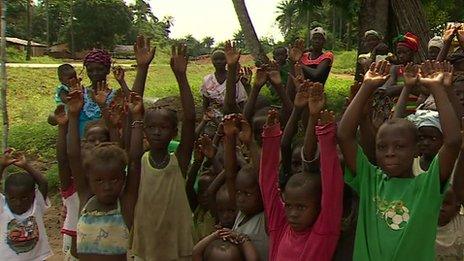Sierra Leone foreign Ebola relief operation criticised
- Published
- comments
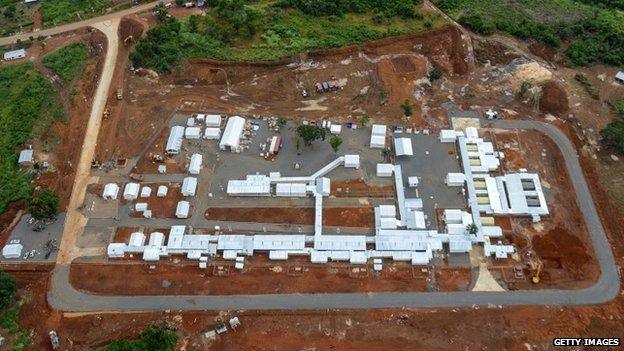
Almost four weeks after Kerry Town opened, there is growing concern that the facility is seriously behind schedule
On a sweltering afternoon, an ambulance crawled slowly along the fresh gravel path behind Kerry Town - the centrepiece of Britain's contribution to the fight against Ebola here in Sierra Leone.
The vehicle parked at the back gate and a team of white-suited medics carried out the first of four confirmed Ebola patients onboard.
One - a 40-year-old man - would die minutes later.
"You never know what you'll find when you open those doors," said Irish doctor Carrie Garavan, adjusting the protective headgear on a Sierra Leonean medic.
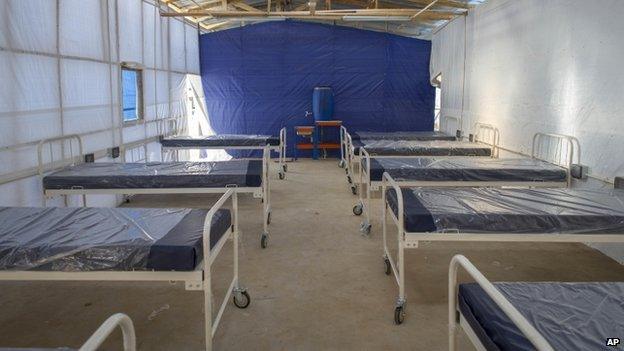
Only 14 of Kerry Town's 80 beds are currently occupied
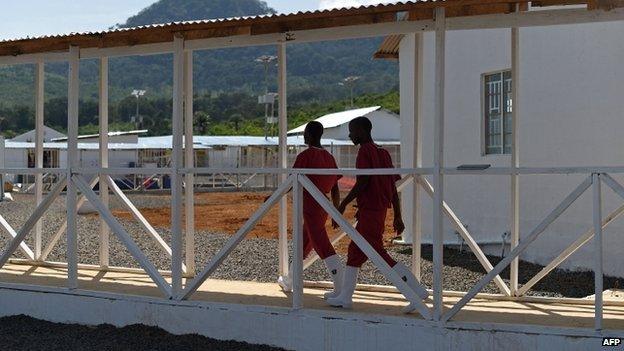
It will take time for staff at Kerry Town to adjust to what experts there say is a very dangerous environment
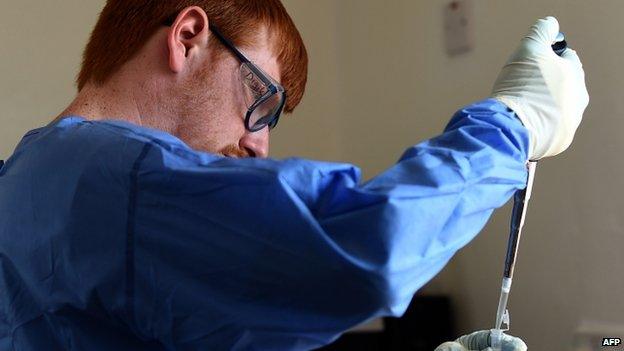
Virologists are now at work in the Kerry Town treatment centre
The ambulance's arrival coincided with a shift change at Kerry Town - a huge logistical operation.
It takes 20 minutes for each health worker to put on the elaborate protective clothing required to enter the Ebola red-zone and its 80 beds.
"It takes time. You can't rush. You can't be complacent. The safety of our staff is of paramount importance," said Dr Garavan, who is overseeing a large team of British, Cuban, Sierra Leonean and other international staff at the green-field site about one hour's drive outside the capital, Freetown.
But almost four weeks after Kerry Town opened, there is growing concern - expressed vocally by some Sierra Leoneans, and more privately by foreign humanitarian experts - that the facility is seriously behind schedule and lacking a sense of urgency.
'Complete departure'
So far, a total of 44 patients have been admitted. Fourteen of Kerry Town's 80 beds are currently occupied.
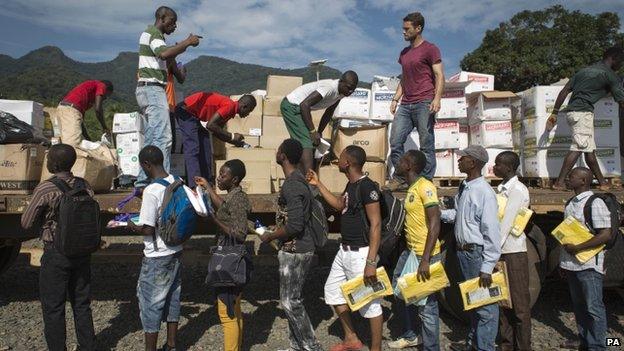
Save the Children says that it has the personnel in place at Kerry Town but the facility has yet to run at full capacity
"It's very, very, very slow," said Charles Mambu, director of Sierra Leone's Health for All coalition.
"Our only hope was in Kerry Town. Why is it not fully occupied? We are not happy with what's happening here. We call on our former colonial masters - you have to do more."
Kerry Town is being run by Save the Children - a British charitable organisation that acknowledges it has stepped into profoundly unfamiliar territory.
"This is a complete departure. Are we up to the job? Well... No-one else was prepared to do it. We said at the outset we didn't have the right level of experience but we'd acquire it and we've hired an awful lot of really competent people and put it together," said Michael Von Bertele, Save the Children International's Humanitarian Director.
"I make no excuses. Many of the staff we've got are very inexperienced and we've got to move very slowly.
"It's a very dangerous environment. I think the organisations doing this well started in exactly the same place.
UK Ebola mission in Sierra Leone
£125m
Pledged by UK to help fight disease
-
780 British health staff volunteers helping to cope with the crisis
-
700 Hospital beds supported by UK - tripling Sierra Leone's capacity
-
750 Military staff to help construct treatment centre and other facilities
-
100 Beds on board medical ship RFA Argus being deployed to region
"[The French medical charity] MSF for example - they've got years and years of experience... and they make it look easy and I sincerely hope that in six weeks time we'll make it look easy. Our plan was always to scale up slowly," he said.
In the meantime, staff at Kerry Town say the criticism - which included a recent MP's question in the British Parliament - is taking a toll.
"A lot of the team are upset. I think it's terribly unfair and unfounded and I do hope people stop," said Dr Garavan.
But there were smiles and songs a few minutes later, when staff gathered to say goodbye to 21-year-old student Kadiatu Sesay, who was being discharged after beating Ebola. She is only the third patient to be sent home so far.
"I feel so happy. This is the happiest day of my life," said Ms Sesay, who admitted she'd been sceptical about the virus before she caught it, and now plans to convince her friends and neighbours to take every precaution.

Read Andrew Harding's other reports from Sierra Leone:
